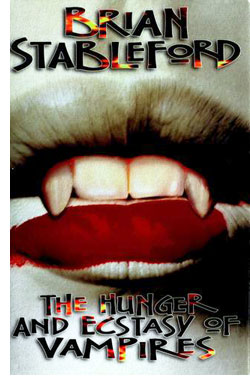 |
 |
 Brian Stableford
Brian Stableford
The HUnger and Ecstasy of Vampires
Mark V. Ziesing Publishers
US Hardcover First Edition
ISBN 0-929480-80-5
Publication Date: 03-15-1996
206 pagess; $25
Date Reviewed: 03-31-1996
Reviewed by: Rick Kleffel © 2002
Index:
Horror
Science Fiction
Fantasy
General Fiction
Editor's Note: Brian Stableford was the first writer to bring me back to Vampires after a long time of ignoring the genre. 'The Empire of Fear', 'Young Blood' and this book, from a British publisher and more notably, the amazing Mark V. Ziesing, comprise a trio of very different visions of this critter. He'd follow it up with 'The Werewolves of London' trilogy, a magnificent story arc.
It's hard to write an original vampire novel. The field is so crowded with entries of all types — from SF to bodice-rippers, from punkettes to romantic poets — that to find a new niche in this overworked specialty category is quite difficult. The writer who seems most adept at this task is Britain's Brian Stableford, who's written three recent novels about vampires, all from very different perspectives. His "Empire of Fear" was a science fiction thought experiment set in the 16th century, while "Young Blood" was an existential examination of being, madness and disease. It was a message from the marketing department at his British publisher which resulted in his latest novel, "The Hunger & Ecstasy of Vampires". It seemed that they had deemed the title "Young Blood" was not catchy enough for the novel he had turned in, and they suggested something with the word "vampire" would be most appropriate. He suggested the title of the present novel, with a disclaimer that "the original title...was insufficiently sexy to hold its own in that perfervid hotbed of competition...". The marketing department yielded, "Young Blood" was published under its original title, and Stableford set forth to create a novel appropriate for his market-oriented title.
The result is a novel that begins in familiar territory but quickly journeys where no vampire novel has gone before. A duel of honor is fought before dawn in France, in 1894. A man is accidentally killed. A year later, the survivor is accompanying Oscar Wilde to a gathering being given by Professor Edward Copplestone. Attending the dinner are characters both real and assimilations of fictional and real characters. Professor Copplestone, clearly ill, gives his report on a drug-induced hallucination he experienced which may have been time travel. In three separate visits or visions, he traveled a future earth where humanity has been overrun by vampires.
Stableford does much more than create another alternate history novel, or steampunk adventure. In "The Hunger & Ecstasy of Vampires", he examines the character as a narrative device, and plays off his characters and the mystery of who they might be in a manner reminiscent of Stanislaw Lem or Philip K. Dick. He explores his possible realities with a remarkable Victorian vision, focusing everything through his own extensive historical and literary knowledge. Copplestone's visits to the future are remarkably well-rendered, and include some astonishing imagery. Stableford subtly pays heed to recent developments in nanotechnology and genetic engineering without being overbearing about it.
Central to the novel is the mystery of just who is sitting around this table listening to Copplestone's tale. Stableford mixes his fictional and real characters with perfect ease, while he peppers the text with informed speculation. For fans of Victorian SF and scientific romance, it's a feast of imagination. "The Hunger & Ecstasy of Vampires" is the third totally original vampire novel that Brian Stableford has written, in a sort of anti-series. For readers who like their vampire fiction imaginative, Stableford's anti-series is a breath of fresh air.
|
 |
|
|
 |
| |
Review Archive
All Reviews alphabetized by author.
General Fiction
Non-Genre, general fiction and literature.
Horror
Supernatural fiction, supernatural horror and non-supernatural horror.
Science Fiction
Science fiction, science fantasy, speculative fiction, alternate history.
Fantasy
Fantasy, surrealism and magic realism.
Mystery
Crime, thrillers, mystery, suspense.
Non-Fiction
Non-Fiction, True Crime, Forteana, Reference.
Poetry
|
|
 |
|




